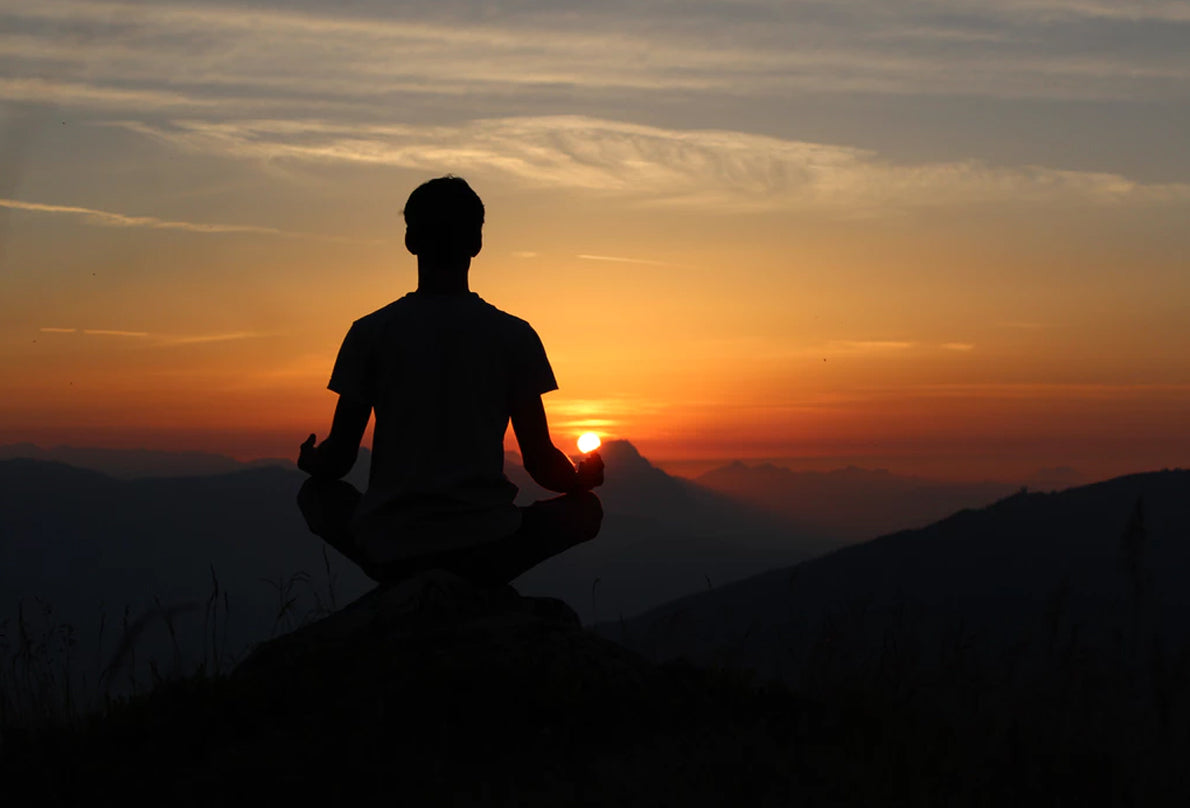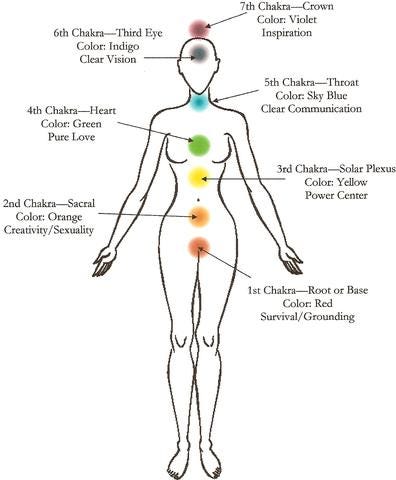Chakras are energy centres within the human body that help to regulate organ function, immune system and emotions. When you are feeling a little off-balance in your chakras, it is very important to know how you can realign them back into place as the balance of chakras is very important to your body and health.
Why is the balance of our chakras important?
When your chakras is blocked, it is thought to manifest as an imbalance in the body, mind and/or spirit. An imbalance of chakras can also result in weakness in your emotional behaviour and a breakdown of your physical state.
If you have achiness or stiffness in your body, or is experiencing recurring emotions and fears, your chakra(s) may be blocked, thus causing an imbalance. One of the easiest ways to get your chakras back in balance is by using essential oils.
The seven main chakras
There are seven main chakras that governs specific functions in the body. They have their own vibrational frequency, colour and meaning, but each is linked and in tune with all the others.
Root Chakra (Muladhara)
Location: The Root chakra sits at the base of your spine where the tailbone is.
Governing body parts: Bladder, large intestine, skeleton, foot, leg, teeth
Element: Earth
Root chakra controls our sense of survival. Our fight or flight response is initiated from Root chakra energy. It is the chakra of stability, security and basic needs. This chakra is comprised of whatever grounds you to stability in life, including your basic needs like food, water, shelter and safety. When your Root chakra is balanced, you feel a sense of belonging, security and an increased sense of self-worth. Mentally, you will have an improved concentration, persistence, clear thinking and the ability to set goals and prioritize. Emotionally, you feel passionate and loved.
What happens if there is an imbalance of Root chakra?
Physical: An imbalance of root chakra can result in problems in the legs, feet, rectum, tailbone, immune system, male reproductive parts and prostate gland. Those with root chakra imbalance are also likely to experience issues of arthritis, knee pain, sciatica, eating disorders and constipation.
Psychological: Feelings affecting our basic survival needs such as money, shelter, food, and the ability to provide for life's necessities. Those with an imbalance of Root chakra will also have feelings of anxiety, fear, panic, worry and tend to overthink.
Sacral Chakra (Svadhisthana)
Location: The Sacral chakra is located two to three inches below your navel, at the level of the lumbar vertebrae.
Governing body parts: Genitals, ovaries, testicles, lymphatic system
Element: Water
The Sacral chakra is the centre of our emotions, particularly in the expression of our sensual and sexual desires. It is the driving force for enjoyment of life, and it allows us to seek pleasure in our lives through feelings and sensations. A person who has a balanced Sacral chakra is thought to be passionate, sensual and connected to his or her feelings.
What happens if there is an imbalance of Sacral chakra?
Physical: When the Sacral chakra is blocked, some symptoms that may arise are hip pain, lower back pain, lower abdominal pain and problems with reproductive organs. Because the Sacral chakra is linked to the lymphatic system, issues with fluid in the body including bladder and kidneys may also manifest.
Psychological: You may develop an insatiable appetite for things, but outwardly, you are unable to "lose control", as a result, you become disconnected from your feelings. Since the Sacral chakra controls emotions, any imbalances in this chakra will result in a lack of emotions in life.
Solar Plexus Chakra (Manipura)
Location: The solar plexus chakra is located just behind the navel region below the rib cage.
Governing body parts: Stomach, liver, large intestine, pancreas and the eyes and face.
Element: Fire
The Solar Plexus chakra is the power centre that can help you achieve your goals and desires. It is the source of personal power, self-belief and self-worth, and it can be activated when you muster the courage to do something that is outside of your comfort zone, such as speaking up for yourself. Those with a well balanced Solar Plexus chakra can be seen with a tall, upright posture with a firm voice that speaks with conviction and strength.
What happens if there is an imbalance in Solar Plexus chakra?
Physical: Because the Solar Plexus chakra is situated in the centre of the body, physical difficulties would also originate in the area when there is an imbalance of this chakra. Some of the physical difficulties would include gas, nausea, ulcers, diabetes, celiacs disease and liver disease.
Psychological: If there is an imbalance in Solar Plexus chakra, life becomes a series of disappointments and frustrations, with a pessimistic view of life. Those affected by a blocked Solar Plexus chakra have low expectations and are usually shy and rarely take on leadership roles. Feelings of inadequacy, and feeling of being unappreciated and undervalued are also signs of a blocked Solar Plexus chakra.
Heart Chakra (Anahata)
Location: The Heart Chakra is located in the centre of the chest
Governing body parts: Cardiac system, lungs, heart
Element: Air
The Heart chakra is all about connecting and relating to others, and also being loved and connected in the world. There are few inevitable events in life that may set us back, such as ended relationships, layoffs or lack of support from others. These events which causes us to feel wounded or neglected can cause a blockage of this chakra, resulting in the imbalance.
What happens if there is an imbalance in Heart chakra?
Physical: The physical symptoms are easy to notice, sometimes it can be felt as a tightness in the chest, or difficulty breathing. Visually, those with a blocked Heart chakra can have slumped shoulders to signify the need to protect the heart.
Psychological: The primary emotion that the affected person feel is unloved, alone and unworthy. A block in this chakra may also manifest as a wall to love, meaning when you are offered love, you tend to reject it or held it away because you don't trust taking it in.
Throat Chakra (Vishuddha)
Location: The Throat chakra is located in the neck and shoulder region
Governing body parts: thyroid, esophagus, tooth, neck, trachea, gums
Element: Space or Sound
The Throat chakra is driven by the principle of expression and communication. It is the expression of yourself, and standing up for what you believe in. Naturally, the Throat chakra has a connection to the Sacral chakra, which is the centre of our emotions. Those with a well-balanced Throat chakra has the ability to connect and communicate with others well, and express him or herself in term of speaking out and projecting creativity into the world.
What happens if there is an imbalance of the Throat Chakra?
Physical: When there is an imbalance of the Throat chakra, it can manifest as a lack of control over one's speech or being verbally aggressive. Gossiping, telling lies and nonstop talking yet not being able to listen to others is also a sign of an imbalance of the Throat chakra
Psychological: Emotionally, there is a fear of public speaking, and excessive secretiveness or shyness can also be portrayed as an imbalance of this chakra. As a center of communication, if this chakra is blocked, it disallows you to communicate and express yourself freely.
Third Eye chakra (Ajna)
Location: Located between the eyebrows, and behind the forehead
Governing body parts: Eyes, nervous system, brain, ear, pituitary gland
Element: Light
The Third Eye chakra is responsible for intuition, imagination, thought and self-awareness. This chakra also helps to regulate the energy associated with insight and wisdom where you not only "see", but you also "understand". With a balanced Third Eye chakra, you are able to visualise the best of yourself in the world.
What happens if there is an imbalance of the Third Eye chakra?
Physical: Poor vision is one of the cues of an imbalanced Third Eye chakra, which visionary problems stemming from headaches, migraines and dizziness. In serious cases, it may lead to brain tumours, stroke, learning disabilities and spinal dysfunction.
Psychological: When your Third Eye is blocked, you may feel a mental confusion, poor judgement, memory problems, lack of concentration or discipline and a lack of touch with reality.
Crown Chakra (Sahasrara)
Location: Crown chakra is located at the very top of the head
Governing body parts: Nervous system, endocrine system, brain, pineal gland, cerebral cortex
Element: Thought
The Crown chakra is the receiver and giver of energy and consciousness. This energy of this chakra allows us to experience unity and the realization that everything is connected at a fundamental level, and at this level of chakra, there is serenity, joy and deep peace about life. The Crown's governing body part, the pineal gland, links the brain and soul, together, they allow wisdom to flow to us and we feel the spiritual connection to the Divine.
What happens if there is an imbalance of the Crown chakra?
Physical: Things to look out for in someone who has a blocked Crown chakra is a lack of care and compassion towards others, excessive egotism, nightmares, headaches, migraines, light sensitivity, and learning difficulties
Psychological: Psychologically, you may also experience a loss of identity, apathy, denial and mental illnesses that involve delusions.





Share:
How to Choose the Best Essential Oil for Yourself
Aroma Nebuliser Dos and Don'ts